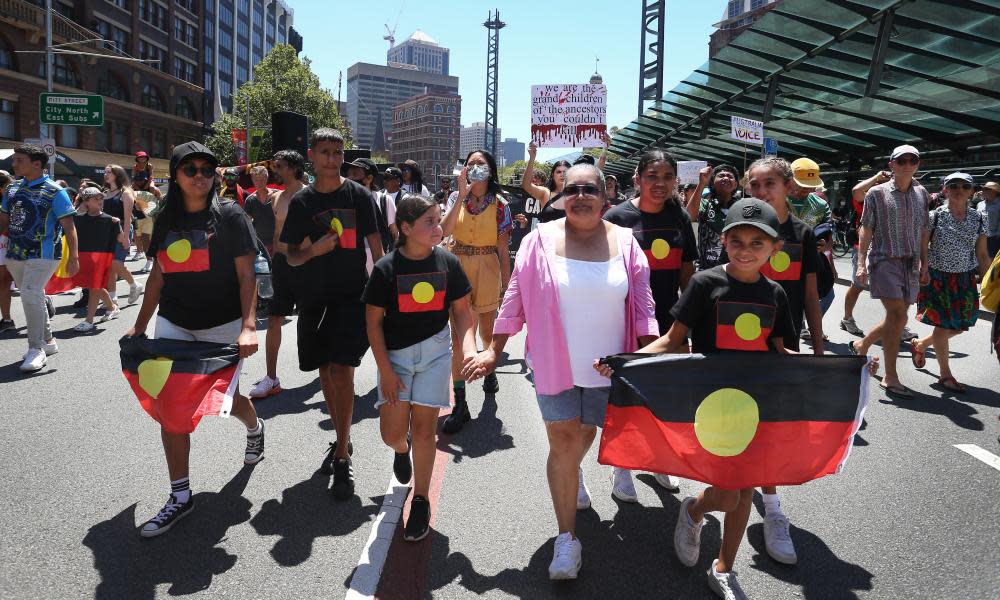In the clamour and confusion around the Indigenous voice, the media has a special responsibility

For years Australians have acknowledged the obviously inappropriate date of our national day, but enjoyed the late summer day off anyway.
The Invasion Day rallies have grown over time, the Triple J Hottest 100 has shifted, corporations and councils have changed policies and practices, but the unanswered question at the heart of our national identity was never going to be addressed only by “changing the date”. The protesters on the first Day of Mourning back in 1938 knew that, as Wesley Enoch discussed with Laura Murphy-Oates in this episode of Full Story.
But this 26 January came around just as Australia began to finally, belatedly, have that foundational conversation, and it has started with more confusion than calm.
Related: What is the Indigenous voice to parliament and how would it work?
The Albanese government, poised to announce details of the referendum on constitutional recognition and the Indigenous voice to parliament that the prime minister promised with such passion at Garma last year, used the day to frame the referendum as an opportunity for the nation to seize a unifying and historic moment.
But Indigenous opponents of the voice sought to use the traditional Invasion Day rallies as a de facto launch of a no campaign, arguing that justice can only be achieved via a treaty. It was deeply confusing for many accustomed to attending the gatherings with a unity of purpose, and infuriating for those who felt the events had been co-opted. Marcus Stewart, a member of the First Peoples’ Assembly of Victoria, said the rallies had been “sabotaged” and he felt unable to attend.
Sign up for Guardian Australia’s free morning and afternoon email newsletters for your daily news roundup
This is a complex discussion, weighted by being 235 years overdue. It demands, but all too often lacks, perspective and nuance. Opposing voices are coming from both the far left and the right. For many voters, reaching a considered decision will require far more backstory and context than can fit neatly into a “he said/she said” version of the news.
The television grabs show the opposition leader, Peter Dutton, demanding “detail”, suggesting the prime minister hadn’t “decided on it” yet and implying Labor was hiding something. But as the Indigenous leader Noel Pearson pointed out on ABC Radio National breakfast this week, the actual details will be decided by the parliament, including by Dutton and his colleagues. Australians are not being asked to vote on a specific model, but on an “in principle” constitutional question. Guardian Australia’s Indigenous affairs editor, Lorena Allam, described the clamour for early detail as being “designed to sow doubt and confusion”. Pearson described it as a “spoiling game”.
And as Prof Megan Davis explained to Guardian Australia recently, the design principles are already clear, including that the voice was intended to give Indigenous Australians a say in matters affecting them, that it would not be responsible for program delivery, would not have a veto power, would be chosen by First Nations people and would be representative, accountable and transparent.
The National party says it is opposed because the voice won’t “close the gap”, setting up the false dilemma that constitutional recognition and “better services on the ground” are somehow an either-or proposition, with the crime wave in Alice Springs providing a useful hook for the argument. It’s impossible to prove the counterfactual put by the Indigenous affairs minister, Linda Burney, this week, that an Indigenous voice might have prevented the situation in Alice from escalating into a crisis, but do the critics really contend that having clear advice from the community would not have helped the situation, or that Indigenous communities have to somehow choose between being heard and being helped?
Related: Why a voice to parliament won’t impact First Nations sovereignty as Lidia Thorpe fears
And the Greens senator Lidia Thorpe has hardened her opposition to the voice on the basis that it would amount to “ceding sovereignty”, amounting to setting up “an advisory body to the colonial system”. The assertion regarding sovereignty does not withstand scrutiny, as Canberra reporter Paul Karp explains.
As the debate kicks off, polls still show a majority in favour of the voice, but support softening, and many respondents, unsurprisingly, not sure they grasp the detail.
This is a discussion where different views need to be heard, not just from politicians and pundits but in particular from the Indigenous communities who have the most at stake.
In this discussion the media has a particular responsibility to help readers understand the facts and the historical, political and legal context, to call out falsehoods and to avoid fuelling an ideological outrage cycle. It’s just too important for that. Every Australian needs to engage with the details over the next six months, and it’s our job to help them.

 Yahoo News
Yahoo News 
